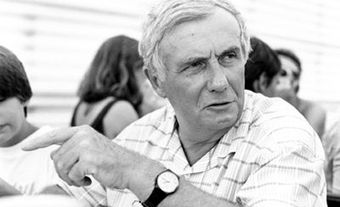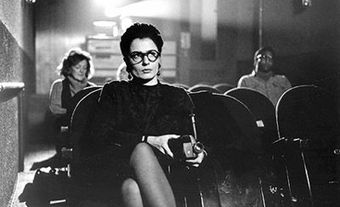Radford, Tom
Tom Radford, film director, writer, producer (b at Edmonton 12 March 1946). The desire to document seems to run strongly in Tom Radford's family: his grandmother, Gertrude Hogg, kept a journal about the family's early days in Edmonton; his grandfather was editor of the Edmonton Journal when it won a Pulitzer Prize in journalism in 1936. Radford has written, produced and directed well over 50 films, most of which have been documentaries about events or notable personages in Alberta history.Tom Radford studied Canadian history at the University of Alberta in the late 1960s, quitting halfway through his masters to begin work on Ernest Brown, Pioneer Photographer (1974). His change in career goals bore immediate fruit: the film won best overall for Alberta at the Yorkton International Documentary Festival.
In 1971, along with fellow filmmakers Anne WHEELER and P.J. Reese, Radford founded the production and distribution company Filmwest Associates. It was a pioneering venture in a province that at the time had little to no film infrastructure, and it continues today as a successful distributor of educational and independent films.
From Land (1971), a look at the Great Plains through the eyes of Native artists and writers, through to Worlds Collide (2005), which followed an Inuit family searching for its lost history, Radford has evinced an interest in dispossessed cultures. His second film, Death of a Delta (1972), won a prize at the Festival dei Populi in Florence for its unswerving look at the citizens of Fort Chipewyan, Alta, as they fought against the building of the Bennett Dam. In 1980, Radford left Filmwest to found the Northwest Studio of the NATIONAL FILM BOARD of Canada in Edmonton, serving as executive producer until 1985. During this period he produced over 20 films, including the early work of Anne Wheeler and Gil Cardinal, whose Radford-produced Foster Child won a Gemini Award in 1988.
Tom Radford stepped up his pace through the 1980s and 1990s with an eclectic choice of subjects ranging from country-celtic duo The Great Western Orchestra (The Buffalo Ground, 1995) to World War II fighting ace Wop MAY (Distant Skies, 2000) and conservationist/author Grant MACEWAN (The Tree Planter, 2001). Life After Hockey (1990), his collaboration with playwright Ken Brown, won best overall, best drama and best director at the Alberta Film Awards, while Tickling the Dragon's Tail (1999), a documentary about Canadian physicist Louis Slotin, took best director at the 1999 Alberta Film Awards. His efforts have been appreciated in filmmaking circles; when Arctic Dreamer (2004) won the Gemini for best documentary biography in that year, it was the tenth time Radford's films had won national or international honours.
Tar Sands, The Selling of Alberta, a documentary directed by Radford and produced by Peter RAYMONT for CBC, attracted international attention when it premiered on television in 2008. Narrated by Ann-Marie MACDONALD, the film examines the rapid oil sands development near Fort McMurray and the resulting political, social and environmental impact.
Radford's stills photography has been presented at the NATIONAL GALLERY OF CANADA, and he has edited two books: Best of Alberta (1987) and the bestselling Alberta, A Celebration (1979). He was a founder of the National Screen Institute, and a founding partner in Film Frontiers, Great North Productions, and Clearwater Media. In 2005 Radford was commissioned by the CBC to create Alberta Bound, a look at 100 years of Alberta music, profiling the likes of Wilf CARTER, NICKELBACK and k.d. LANG.
Tom Radford's influence on the provincial and national film scene has been considerable, both artistically and as an example for filmmakers working outside of the mainstream. His telling eye for detail has shone a light on neglected areas of Canadian and Prairie history, and Radford has amassed an impressive body of work in the process.

 Share on Facebook
Share on Facebook Share on X
Share on X Share by Email
Share by Email Share on Google Classroom
Share on Google Classroom


